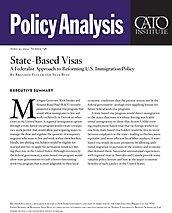Michigan Governor Rick Snyder and Senator Rand Paul (R‑KY) recently proposed a regional visa program that would allow immigrants to live and work exclusively in Detroit or other cities in the United States. A regional immigration option through a state-based visa program would create a temporary work permit that would allow participating states to manage the flow and regulate the quantity of temporary migrants who want to live and work within their borders. Ideally, law-abiding visa holders would be eligible for renewal and free to apply for permanent residency during their stay in the United States. Although overseen by the federal government, a state-based visa program would allow state governments to craft a better-functioning work-visa program that is more adaptable to their local economic conditions than the present system run by the federal government—perhaps even supplying lessons for future federal work-visa programs.
A state-based visa program would direct immigration to the states that want it without forcing much additional immigration on those that do not. Unlike existing employment-based visas that tie foreign workers to one firm, state-based visa holders would be free to move between employers in the state—leading to thicker, more equitable, and more efficient local labor markets. A state based visa would increase prosperity by allowing additional migration to portions of the country and economy that demand them. Successful international experiences with regional visas in Australia and Canada provide some valuable policy lessons and hint at the major economic benefits of such a policy in the United States.
About the Authors

This work is licensed under a Creative Commons Attribution-NonCommercial-ShareAlike 4.0 International License.
